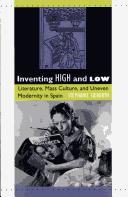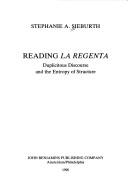| Listing 1 - 5 of 5 |
Sort by
|

ISBN: 082231441X Year: 1994 Publisher: Durham, N.C. Duke University Press
Abstract | Keywords | Export | Availability | Bookmark
 Loading...
Loading...Choose an application
- Reference Manager
- EndNote
- RefWorks (Direct export to RefWorks)
Sociology of literature --- Fiction --- Spanish literature --- anno 1800-1999 --- Spain --- Spanish fiction --- Literature and society --- Popular culture --- History and criticism.
Book
ISBN: 1442661445 9781442661448 9781442644731 1442644737 1442661453 Year: 2018 Publisher: Toronto : University of Toronto Press,
Abstract | Keywords | Export | Availability | Bookmark
 Loading...
Loading...Choose an application
- Reference Manager
- EndNote
- RefWorks (Direct export to RefWorks)
Stephanie Sieburth's Survival Songs explores how a genre of Spanish popular music, the copla, as sung by legendary performer Conchita Piquer, helped Republican sympathizers to survive the Franco regime's dehumanizing treatment following the Spanish Civil War (1936-39).
Coplas --- Popular music --- Psychic trauma --- Political persecution --- Folk songs, Spanish --- Poetry --- Spanish poetry --- Emotional trauma --- Injuries, Psychic --- Psychic injuries --- Trauma, Emotional --- Trauma, Psychic --- Psychology, Pathological --- Music, Popular --- Music, Popular (Songs, etc.) --- Pop music --- Popular songs --- Popular vocal music --- Songs, Popular --- Vocal music, Popular --- Music --- Cover versions --- Political repression --- Repression, Political --- Persecution --- Civil rights --- History and criticism. --- Psychological aspects --- History --- Piquer, Conchita, --- Piquer López, Concepción, --- López, Concepción Piquer, --- Piquer, Concha, --- Criticism and interpretation. --- Spain
Multi
ISBN: 9781442661448 9781442644731 Year: 2018 Publisher: Toronto, Ont. University of Toronto Press
Abstract | Keywords | Export | Availability | Bookmark
 Loading...
Loading...Choose an application
- Reference Manager
- EndNote
- RefWorks (Direct export to RefWorks)

ISBN: 1283358727 9786613358721 9027278172 9789027278173 1556190697 9781556190698 1556190700 9781556190704 9027217440 9789027217431 9027217432 Year: 1990 Publisher: Amsterdam Benjamins
Abstract | Keywords | Export | Availability | Bookmark
 Loading...
Loading...Choose an application
- Reference Manager
- EndNote
- RefWorks (Direct export to RefWorks)
Criticism of La Regenta has until recently focused on the text's plot as an extraordinarily coherent and convincing fictional world. Stephanie A. Sieburth demonstrates that the devices which produce order in the text are counterbalanced by an equally strong tendency toward entropy of meaning. The narrator is shown to be duplicitous and unreliable in his judgments on characters and events. Without an omniscient narrator, readers must interpret for themselves the complex intertextual structure of the novel. Saints' lives, honor plays, and serial novels each provide partial reflections of Ana Ozo
Digital

ISBN: 9781487531683 9781487505172 Year: 2019 Publisher: Toronto, Ont. University of Toronto Press
Abstract | Keywords | Export | Availability | Bookmark
 Loading...
Loading...Choose an application
- Reference Manager
- EndNote
- RefWorks (Direct export to RefWorks)
| Listing 1 - 5 of 5 |
Sort by
|

 Search
Search Feedback
Feedback About UniCat
About UniCat  Help
Help News
News